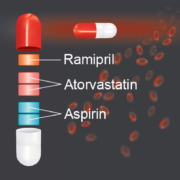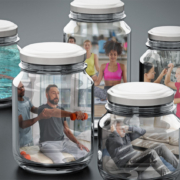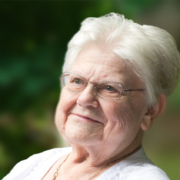Dr. Chet’s Health Memos
 If it’s in the health news today, I’ll be writing about it as soon as I read the research, both old and new. With my email Health Memos, you’ll know more about making lifestyle choices that will help you get and keep good health. These free, concise updates on health are emailed to subscribers twice a week. Subscribe today and get a free MP3, in English or Spanish, of Dr. Chet’s Top Ten Tips—Small Changes for a Healthier Life.
If it’s in the health news today, I’ll be writing about it as soon as I read the research, both old and new. With my email Health Memos, you’ll know more about making lifestyle choices that will help you get and keep good health. These free, concise updates on health are emailed to subscribers twice a week. Subscribe today and get a free MP3, in English or Spanish, of Dr. Chet’s Top Ten Tips—Small Changes for a Healthier Life.
Will the Polypill Reduce Second Heart Attacks?
One of the issues with prevention is having people stick to a plan, even after an event as serious as a heart attack. Lifestyle changes are challenging to stick with, but so is something as simple as taking medications. Remember, this isn’t to prevent a heart attack; it’s to prevent a second one. That’s serious. […]
What Is Secondary Prevention?
Secondary prevention encompasses a wide range of health-related conditions. It includes people with risk factors such as high cholesterol and blood pressure, cigarette smoking, elevated HbA1c, atrial fibrillation, and more. It also includes people who may have had a heart attack, stroke, cancer, or were treated and now are trying to prevent a recurrence of […]
What Is Primary Prevention?
The key to aging with a vengeance is prevention. One of the obvious goals is to prevent problems such as stroke or heart attack in healthy people and in people who have risk factors for disease. Today’s Memo will deal with primary prevention. Primary prevention focuses on helping apparently healthy people prevent the onset of […]
The Spice of Progress
Last week was about consistency, and this week is about variety, the spice of progress. I recently ran into an orthopedist I know whose first words to me were, “What’s wrong with your ankle?” followed by, “How come you’re not walking properly? You’re not toeing off.” He did an assessment later that day. The ankle […]
What We Can Learn From “NYC Point Gods”
We’re watching a little more basketball these days because it’s Riley’s favorite sport. That’s how I discovered a documentary about the glory years of point guards in the 1980s and ’90s in New York City. It may still be a thing, but back then it was special. One part of the documentary focused on one […]
What Not to Do When You Want to Lose Weight
How did my mother-in-law lose 30 pounds when she was completely sedentary? I’ll tell you, but let me tell you first what not to do. Why begin there? Permanently changing your weight (or any other significant health goal) takes a lifetime commitment. You don’t know what life will bring, so the best way to attack […]
Weight Loss Is Always Possible
After last week’s Memos, you may think that you have to do something radical to address your body weight or some other health situation, but that’s not the case. You can lose weight under the most extreme conditions, even if you’re completely sedentary. Let me tell you about my mother-in-law, Ruth Jones. My mother-in-law struggled […]
The Price of Obesity
Continuing with comments made by Bill Maher, he suggests that the prevailing thought is that we can be healthy at any weight. Companies have embraced that thought with workout gear and other products featuring oversized models. Maher then goes on to talk about the ill health associated with being obese. Type 2 diabetes, cardiovascular disease, […]
Feast Mode!
Comedian and political satirist Bill Maher has been one of my favorites since his first show Politically Incorrect aired over 20 years ago. He is also an outspoken critic of our nation’s health: it’s poor and getting worse. On a recent show, he used the term Feast Mode and explained why it’s a problem. Feast […]
Teaching Doctors About Supplements, But Not Really
If you haven’t watched the videos that I talked about Tuesday, please take the time to watch them, preferably before you continue reading—I’d like you to form your own opinion about the videos before you get my perspective. I came away with three opinions about the videos, other than they really focused on dietary supplements […]










